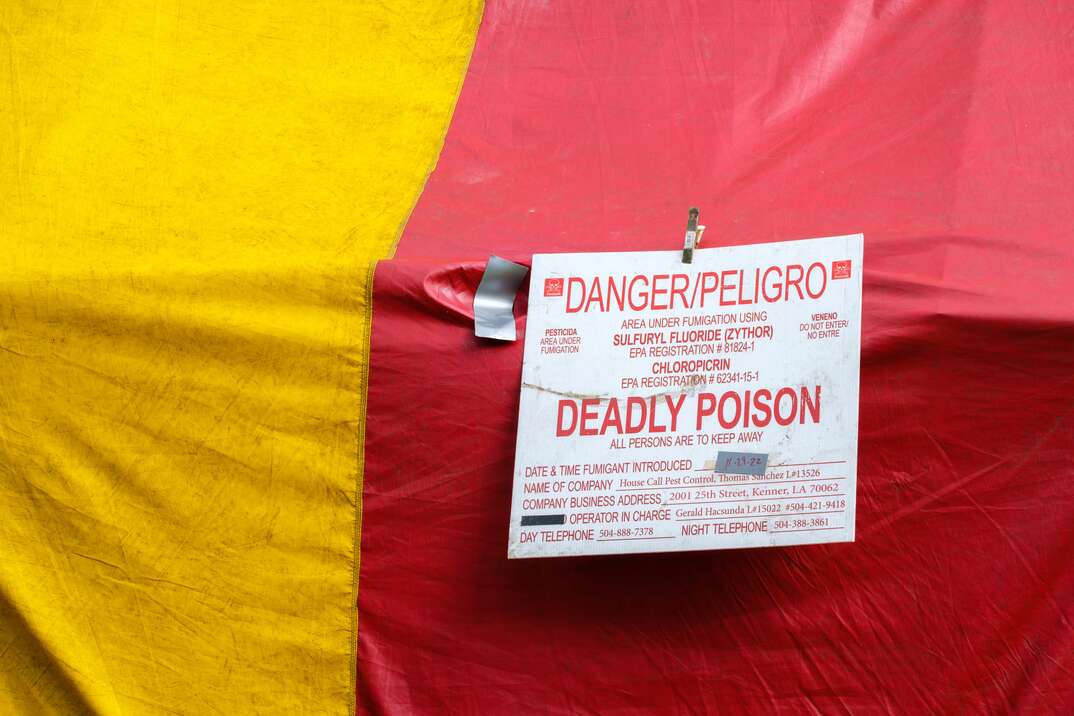- AppliancesElectriciansHVACLandscapingLocksmithPest ControlPlumbingRenovationRoofingT V RepairAll Home Improvement
- Car AccidentClass ActionCorporate LawCriminal DefenseDivorce LawEmployment LawFamily LawFinancial LawLegal AidMedical Injury LawyersMedical MalpracticeReal Estate LawWater Fire RestorationAll Legal
- InvestmentRetirementAll Finance
- Animal InsuranceAutoGeneral InsuranceHealth PolicyHome RentersAll Insurance
- DentalHealth SpecialistsAll Medical
- Animal CareVeterinaryAll Pets
- Auto GlassTowingAll Automotive
What Is Tent Fumigation?

You have your home treated for a bug infestation or tackle pest control with DIY products, but the little creatures keep turning up. Pest control can be like hunting for a needle in a haystack, and if you don't take care of all the bugs, they can reproduce and cause a problem again. And when you're dealing with termite fumigation, you may need a whole-house option to kill everything at once to prevent this from happening.
Read More Pest Control Articles
That's where tent fumigation comes in. Find out more about this process below.
Tenting is the process of covering the entire house with a rubber tent so that pesticides can be released in a controlled manner while still engulfing the entire house. During this process, no people or pets remain inside the house, which means pest control experts can use a lot more — and more effective — pesticide products to rid the house of unwanted pests, such as termites.
What Happens During a Tent Fumigation?
Tent fumigation is a pretty big process involving collaboration between the homeowner and the pest control company. Here's what you can expect before, during and after tenting:
- You'll need to stay somewhere else. You can't stay in your home during fumigation. You'll need to arrange for a place to stay for yourself, your family and any pets in the home.
- You should remove food and other ingestible items. All food should be removed or placed in completely sealed locations or containers. You can't use food that's been left out in containers or boxes that could be penetrated by the pesticides.
- You may need to prepare the home. Your pest control company will provide specific instructions, but you may need to leave doors open, leave keys for the company or even prepare parts of your yard near the home for the tent.
- Pros will place the tent. Once fumigation day arrives, the company will place the fumigation tent around your property. It will entirely enclose your home from top to bottom.
- Fumigation will begin. The fumigation professionals will put pesticides into the tent, using fans and other processes to ensure they work their way throughout the home.
- Venting will occur. Once the pesticide has had time to do its work, the team will open up the tent to begin the venting process. This lets the pesticide dissipate from the house to ensure it's safe to enter again. This process can take a full day or more. Professionals check the safety of the air in the home before allowing anyone to enter.
More Related Articles:
- What to Look For When Hiring an Exterminator
- Are Pest Control Products Dangerous For Kids and Pets?
- What Are Ultrasonic Pest Repellers?
- 10 Ways to Prevent Termites
- How to Spray for Mosquitoes
Many people associate tenting a house with termite fumigation. House tenting is definitely a way to treat termite infestations, but it can be an aggressive approach for other pests, too. Some reasons for fumigating a house via tenting can include roaches, bed bugs and even rodent infestations. To understand the best approach for treating pests in your specific case, it's best to consult with a professional fumigation company.
Elocal Editorial Content is for educational and entertainment purposes only. Editorial Content should not be used as a substitute for advice from a licensed professional in your state reviewing your issue. Systems, equipment, issues and circumstances vary. Follow the manufacturer's safety precautions. The opinions, beliefs and viewpoints expressed by the eLocal Editorial Team and other third-party content providers do not necessarily reflect the opinions, beliefs and viewpoints of eLocal or its affiliate companies. Use of the Blog is subject to the
Website Terms and Conditions.The eLocal Editorial Team operates independently of eLocal USA's marketing and sales decisions.



